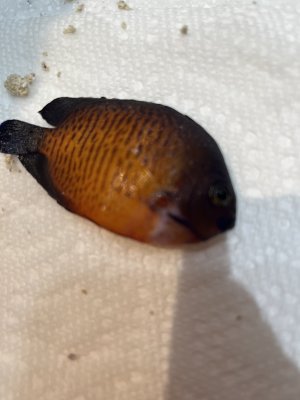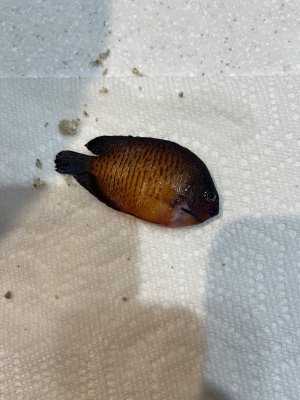Good morning,
Lost this fish, but am still learning so appreciate advice. Please check me on this. Is this an example of a bacterial infection and would you have removed to QT and treated with Metroplex? Is there anything I should do with the DT at this point? (I have another angel, a goby. 3 royal grammas, a talbots damsel, 2 clowns, 3 anemones, an urchin, 10 snails and 4 hermit crabs.).
Tank is all solid in water chemistry, temp and ph. very low nitrate, 0 nitrite and 0 ammonia; ph 8, temp 78, salinity 1.023.
140 gal tank. This angel was introduced to DT tank July 11. It was a QT fish from Dr Reef and my experience with their fish has all been excellent. All other fish in the tank are swimming vigorously and doing well. Two days ago I noticed this angel was hiding more in the rocks and had a white patch on the right gill area. My QT tank isn't quite cycled, so I didn't remove him. He came out to eat both Tuesday and Weds, but still was hiding the rest of the time. Today he was gone or near gone. Pictures attached.
Sorry for the loss Nancy.

The 'mysterious' loss of a fish is frustrating. Photos of a deceased fish aren't the best. My mentor, Dr. Noga, would help any marine aquarist but always wanted to receive the living fish, though it may be near passing. For myself, to give the best suggestions and diagnosis I request a
video longer than one minute under white light up close to the fish, showing both sides of the fish. A video like this can be uploaded to YouTube then the link posted to it, here. Behavior actually seen is the best, along with watching the fish breathe.
Thanks for the info on the system. That is helpful.
With regards to getting a quarantined fish. . .Sources of quarantined fish have different concepts on what
quarantine means. That is, they may each have their own definition. With so many ornamental marine fish coming through the 'system' with diseases, parasites, and injuries, it is hard to address them all. However with regards to a quarantine process you want to know
exactly what the process included. Was the fish de-wormed? Was the fish prophylactically treated with any medications and/or copper? Just how long was the fish kept in quarantine? etc. In a supplier's system, there is a greater risk of cross contamination, i.e., the quarantined fish was exposed to a disease, parasite, etc. at the end of its quarantine time. Lastly some fish are still caught using cyanide and may expire weeks after being captured in the wild but the cyanide damage has already taken its toll.
Under the circumstance you have elaborated and the photos, the area of the fish showing an irregularity seems to be an infection or possibly an injury. Metroplex is about 70% Metronidazole. Metronidazole kills mostly surface parasites (like Brooklynella). Metronidazole (controls common bacterial infections in fish. This exerts a bactericidal action on gram positive and some gram negative bacteria) works best when dosed properly in food (at 0.50% by weight in food). Use Focus or Agar to bind it. From Brine Shrimp Direct: Medicated Brine Shrimp Flake with 2% Metronidazole
from Brine Shrimp Direct Considered by some as a worthless drug, but I consider it of value. Concentrated bath treatment: 25ppm concentration for 24 hours. Internal eating treatment for 3 weeks. QT treatment: Dosage is 25 mg/gal every 48 hours (or every 24 hours for severe problems) with a 25% water change before each treatment. Treat for 10-14 days. The problem with a feeding treatment is trying to get the dose correctly. With marine fish it is difficult to know just how much they get of the medicine.
For bacterial infections, my go-to medicine is an antibiotic. There are several to choose from. Most bacterial infections are of Gram Negative bacteria. Without identifying exactly what bacteria is there (I'm a microbiologist and do my own scrapes and identification under the microscope) I'd use Kanaplex, Maracyn 2, NeoPlex, and others similar. The best antibiotic IMHO is Enrofloxacin (Baytril). As with all antibiotics, there is no test to verify how much is in the water, however, new water used for water changes need to contain the treatment amount of the antibiotic.
If it is bacterial or injury, treatment of the DT isn't called for. I would encourage reviewing what it is you are feeding your fish. Download then read, the
Fish Nutrition document posted here. Most fish when fed as recommended will fend off bacterial infections and heal from injury on their own. In the future I'd consider doing your own quarantine. . .even on fish provided as having been quarantined. A wild fish still has to adjust to its new environment and your system chemistry. Shipping is stressful on the fish. In addition, you want to be sure the fish is eating the best foods, and is in its best condition. So even a couple of weeks in your own QT can be of benefit.


